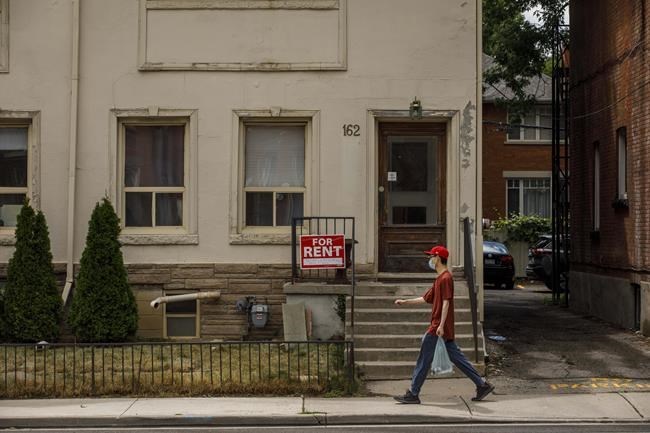TORONTO — A backlog of cases at Ontario's Landlord and Tenant Board has grown to 38,000 and it is taking an average of seven or eight months – sometimes up to two years – for a hearing to be scheduled, the province's ombudsman said Thursday.
The findings are part of a large report from Ombudsman Paul Dubé, who received more than 4,000 complaints – largely from landlords – as part of his investigation. Dubé has issued 61 recommendations aimed at improving the functioning of the board and its "excruciating delays."
When the pandemic hit, the backlog was already at 20,000 applications, and the subsequent move to virtual hearings and a moratorium on evictions impeded the board's efforts to chip away at the backlog, he said.
"The result was not just a litany of bureaucratic failures, like adjudicator shortages, scheduling nightmares and dysfunctional technology," Dubé said at a news conference presenting his report.
"What was most disturbing was how these delays affected real people on both sides of the landlord and tenant relationships."
Tenants were stuck waiting while they endured harassment, unsafe living conditions and improper attempts to force them from their homes, and some landlords had to cope with tenants' abuse and face financial ruin, Dubé said.
One tenant said she filed an application in December 2020 due to black mould, inadequate heat, leaks in the windows and sink, and a malfunctioning stove in her apartment. A hearing was eventually set for January 2022, but it was adjourned because there were too many cases that day, Dubé said. It was adjourned again in March because one member was leaving the board, and the hearing was eventually rescheduled for April 2022, he said.
Another complaint was from a 74-year-old landlord, who said his tenant threatened him with a knife, threw stool and urine at him, intentionally flooded the rental unit with excrement and toilet water, altered the electrical panel and was alleged to be operating a grow op and selling drugs from the unit, the ombudsman said. The landlord had applied to end her tenancy in December 2019 but the board didn't hear the case for a full year and didn't issue the order to vacate until January 2021.
"The board’s excruciatingly long delays have had immense negative impacts on the thousands of landlords and tenants who depend on it to resolve their tenancy issues," Dubé wrote in his report.
NDP housing critic Jessica Bell pointed to a finding from the ombudsman that as of February this year, landlord applications were being scheduled for a hearing within six to nine months, while tenant applications could take up to two years.
"This is discrimination and we urge the (Progressive) Conservatives to immediately step in and fix this injustice," she said.
"Ontarians deserve to have a Landlord and Tenant Board that provides a fast and fair hearing to everyone within 30 days. That is the Landlord and Tenant Board's own standard."
Part of the problem is a shortage of adjudicators, compounded by a cumbersome appointment and training process, Dubé said. The ombudsman noted that the government has pledged to appoint 40 more adjudicators and he urged it to act quickly.
The executive chair and executive director of Tribunals Ontario – which oversees the Landlord and Tenant Board – issued a joint statement saying the board had already taken some actions to address delays, such as implementing an online application system and streamlining processes, but there is more work to do.
"With the new resources we’ve been allocated by the government of Ontario and plans we have underway, many of the report’s recommendations are being addressed," Sean Weir and Harry Gousopoulos wrote.
"We are confident that significant inroads into the backlog will be made this fiscal year."
The board, which receives about 80,000 applications a year, initially attributed delays to a reduction in new adjudicators due to the 2018 change in government that saw appointments slow down, Dubé said. But the board continued to struggle even after appointment numbers had stabilized, then the pandemic further complicated matters, the ombudsman said.
A statement from a spokesperson for the attorney general noted $6.5 million to hire more adjudicators and $28.5 million for a new case management system for Tribunals Ontario, but suggested the ombudsman's report did not tell the full story.
"We are currently reviewing the report, which examined the Landlord Tenant Board (LTB) at a previous moment in time that does not reflect the ongoing work that the Ministry and at Tribunals Ontario is doing to address delays," Andrew Kennedy wrote.
Dubé said both the board and the government have accepted his recommendations and have pledged to report back to his office on their progress in implementing them.
This report by The Canadian Press was first published May 4, 2023.
Allison Jones, The Canadian Press

